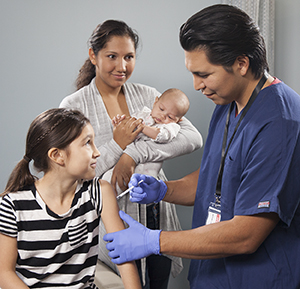Flu Vaccine for Children
Updated for the 2024-2025 flu season
A flu vaccine is the best protection against the flu (influenza) for your child and other family members. The vaccine is given to your child in the form of a shot (injection) or nasal spray. Talk with your child's healthcare provider about which vaccine is best for your child. It’s best to get vaccinated each year as soon as the vaccine is available in your area. This can be at your healthcare provider's office, health clinic, or pharmacy. If you have questions, talk with your child’s healthcare provider.
The CDC and American Academy of Pediatrics (AAP) strongly advise getting a flu vaccine to protect yourself, your family, and others. Flu, COVID-19, and RSV viruses are all likely to spread during flu season. People at high risk for complications from the flu are also likely to be at high risk for serious problems from COVID-19 and RSV, so it's important to get a flu vaccine.

Flu facts
-
In the US, mainly, 3 types of influenza vaccines are available:
-
Inactivated Influenza Vaccine (IIV),
-
Recombinant Influenza Vaccine (RIV), and
-
Live Attenuated (weakened) Influenza Vaccine (LAIV).
-
Flu shots offer protection against 3 or 4 strains of the flu virus. The virus in the flu vaccine has been killed (inactivated) or greatly weakened and won’t give your child the flu.
-
The flu is caused by a virus. It can’t be treated with antibiotics.
-
The flu can be life-threatening. Every year, thousands of people die from complications of the flu.
-
Influenza is not the same as stomach flu, the 24-hour bug that causes vomiting and diarrhea. Stomach flu is most likely caused by a gastrointestinal infection, not the flu.
-
Flu vaccines do not cause any dose-dependent toxicity. They do not cause cancer and infertility.
-
Flu vaccines are safe for most children. If you have questions or concerns, talk with your child’s healthcare provider.
How a flu vaccine protects your child
There are many types (strains) of flu viruses. Medical experts predict which strains are most likely to make people sick each year. Flu vaccines are made from these strains. With the shot, killed (inactivated) flu viruses are injected into your child’s body. The nasal spray contains a greatly weakened version of the virus. The vaccines prompt the body to make antibodies to fight these flu strains.
Some children may get mild symptoms after a flu vaccine. These may include a runny nose, fever, or pain at the injection site for a day or two. Symptoms can be managed with children’s strength over-the-counter (OTC) medicines. Always talk with your child’s healthcare provider before using OTC medicines.
-
Don’t give OTC cough and cold medicines to a child younger than age 6, unless your child's healthcare provider tells you to do so.
-
Don’t give your child or teen aspirin. It can cause a rare but serious condition called Reye syndrome.
-
Don’t give ibuprofen to a baby age 6 months or younger.
Who should get the flu vaccine?
The CDC and the AAP recommend that all children 6 months and older get vaccinated, with some exceptions. The vaccine is most often given by a shot into the muscle. The number of doses of flu vaccine depends on the child's age and vaccine history. Two doses are needed for children 6 months to 8 years who are getting their first flu vaccine.
A nasal spray made of live but weakened flu virus is available for healthy children 2 years and older who don't want the flu shot.
Children younger than 6 months of age are too young to get the flu vaccine.
Some conditions may prevent your child from being vaccinated. Talk with your child's healthcare provider if you are concerned about whether your child should get the flu vaccine. Children may not be able to get a flu shot if they:
Children who should not get the nasal spray flu vaccine include:
-
Children who are immunocompromised due to medications, have congenital or acquired immunodeficiency disorders, HIV infection, and sickle cell anemia
-
Children who are on long-term aspirin or salicylate-containing therapy
-
Children aged 2 to 4 years age with asthma or reported wheezing/asthma in the preceding 12 months